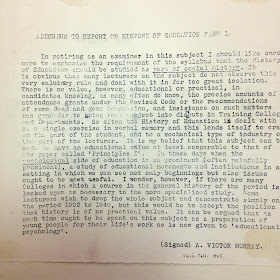By Catherine Sloan
Last week saw the History of Education Society (UK)’s 2015
conference. Hosted by Liverpool Hope University, we arrived at the beginning of
a cold snap for three days of discussion of the themes of 'Science,
Technologies and Material Culture in the History of Education’. The
keynotes by Ruth Watts, Jonathan Reinarz and Claire Jones particularly
emphasised how women have been marginalised both in contemporary perceptions
and in the historiography of science education.
I am currently sitting with my conference notebook which is
packed with points to remember, and questions I wanted to take away with me. My
own research looks at school magazines, so I went to a lot of panels relating
to schooling. What struck me first of all was the range of situations where education
takes place: in hospitals (Mary Clare Martin); in science and technology hobby
clubs (Hilde Harmsen); from popular culture and TV (Craig Spence); and, in the
case of First Peoples in Trinidad and Tobago, from the local community chief
(Bailey-Ellis). There are tensions between this broad experience of learning,
and the development of systems of examination and measuring - tensions exposed
in papers by Cathy Burke on progressive education’s embrace of the sensory, and
James Elwick’s paper on how the nineteenth-century Science and Arts
Examinations' ‘payment by results’ led to a cheating scandal.
I also like going to panels which lie outside my area of
research, as there can be unexpected resonances with my own work. I saw many
papers which shed new light on the research process. I was particularly
interested, due to the focus on material culture, in the discussions of sources
and archives. There was a astonishing array of sources: dermatological
‘moulages’ made of wax (Henrik Essler); botanical models made of wood
(Lorna Stoddart); anatomical specimens pickled in alcohol (Kathryn
Heintzman); and children’s work rescued from a skip (Craig Spence). Many papers
showed the hard work and ingenuity needed to interpret or decode their sources:
Diana Vidal spoke of spotting interesting nineteenth-century educational
posters in the background of a photograph of a Brazilian classroom, and how she
traced the journey of these posters from France; Frances Kelly revealed a
fascinating photo archive at the University of Auckland, and described the
challenges of dealing with unidentifiable, mysterious, or mislabelled
sources; Tugba Karakuş spoke of learning Armenian in order to read
documents; and Melisse Thomas Bailey-Ellis explained how trust and good
relationships were key in gaining access to archives. I really enjoyed the
fascinating biographies of the sources themselves, how they were made,
collected, and survived, and the ingenuity and hard work needed to interpret
them.
This was my first time attending the History of Education
conference, but it didn’t feel like it: I attended the brilliant History of
Education Summer School in Luxembourg in 2015, and a fellow attendee from the
summer school was at the conference. Also, there was a large number of
#twitterstorians there - although I was meeting many of them for the first
time, many seemed like familiar faces! I am a second year D.Phil student, and
this was my first time presenting at HES, but even the chair of my panel was
someone I knew from Twitter. Twitter is a great way to get to know names and
faces, particularly if you are a postgrad and new to the academic world. Also,
following #HES2015 meant I could get a glimpse of papers I’d missed - and if
you want to catch up, check out the Storify of the tweets at https://storify.com/cgsloan/hes2015#publicize.
Thanks are due to Heather Ellis for organising this great
conference, and the History of Education Society for its support in enabling postgrad
students to attend.











